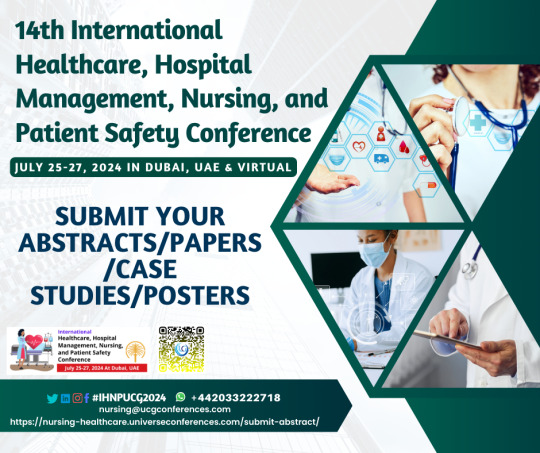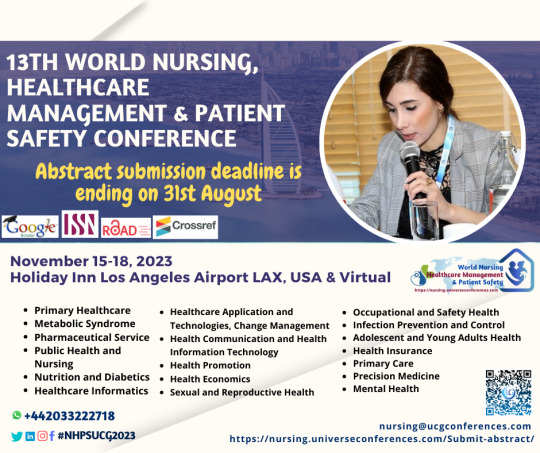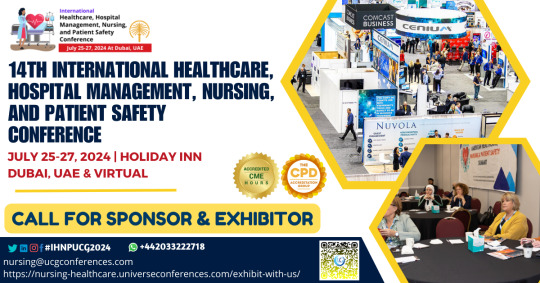#MedicalErrors
Text

We are pleased to announce the Call for Abstract Submissions is now open till March 31st for the upcoming CME/CPD accredited 14th International Healthcare, Hospital Management, Nursing, and Patient Safety Conference, Dubai, UAE, & Virtual from July 25–27, 2024.
WhatsApp: https://wa.me/442033222718
Submit your abstract here: https://nursing-healthcare.universeconferences.com/submit-abstract/
#PatientSafetyConference#PatientSafetyEvent#PatientSafetyMatters#HealthcareSafety#SafeCare#PatientEngagement#QualityImprovement#MedicalErrors#TeamworkInHealthcare
0 notes
Link
#PatientSafety#IdentityManagement#IncidentResponse#HealthcareSecurity#RightPatient#MedicalErrors#HealthIT#DigitalHealth#HealthcareTechnology#HealthcareInnovation#HealthcareManagement#HealthcareCompliance#HealthcareDat
0 notes
Text
"Was my D&C specimen labeled before testing?" #D&C #miscarriage #pregnancyloss #medicalerror #womenshealth #pregnancylossawareness --- Title: The Importance of Proper Labeling in D&C Procedures for Miscarriage Testing Are you someone who has experienced multiple miscarriages and been advised to get a D&C for testing, only to encounter a frustrating situation where the testing was not done due to specimen labeling errors? You are not alone... Read more: https://mymetric360.com/question/was-my-dc-specimen-labeled-before-testing/?feed_id=34978
0 notes
Text

We are pleased to announce the Call for Abstract Submissions is now open for the upcoming CME/CPD accredited 13th World Nursing, Healthcare Management, and Patient Safety Conference, which is CME/CPD recognised, from November 15–18, 2023, Holiday Inn Los Angeles Airport LAX, USA & Virtual.. We invite you to share your valuable insights, groundbreaking research, and innovative ideas by submitting abstracts for consideration.
WhatsApp: https://wa.me/442033222718
Submit your abstract here: https://nursing.universeconferences.com/submit-abstract/
#PatientSafetyConference #PatientSafetyEvent #PatientSafetyMatters #HealthcareSafety #SafeCare #PatientEngagement #QualityImprovement #MedicalErrors #TeamworkInHealthcare
0 notes
Photo

How can we avoid or reduce medical errors? Help mothers build a supportive maternal health team, use the systems in place to reduce medical errors in medicine, and use the Ethics team a lot more than we do. I’ll be sharing resources, doing a few LIVES and leading the conversation on avoiding and reducing medical errors this week. #businesslawyer #marylandlawyer #yournurselawyer #howardalumna #howardalumni #healthcareconsultin #howarduniversity #howardlaw #hulaw #healthlaw #diversityandinclusion #lawyers #addiction #drugaddiction #medicalerrors #maternalhealth #blackmothers #maternalhealthmonday #blackmothersmatter #blackmotherhood #mymotherhood #birthing #birthwithoutfear #mothersofinstagram #doulas #birthcenter #holisticwellness #laboranddelivery #midwives #midwifery https://www.instagram.com/p/CGfrWuGB45L/?igshid=d0ddt56r3nms
#businesslawyer#marylandlawyer#yournurselawyer#howardalumna#howardalumni#healthcareconsultin#howarduniversity#howardlaw#hulaw#healthlaw#diversityandinclusion#lawyers#addiction#drugaddiction#medicalerrors#maternalhealth#blackmothers#maternalhealthmonday#blackmothersmatter#blackmotherhood#mymotherhood#birthing#birthwithoutfear#mothersofinstagram#doulas#birthcenter#holisticwellness#laboranddelivery#midwives#midwifery
3 notes
·
View notes
Photo

Friday's Fact: Healthcare Is Broken You don't have to do things the traditional way. You can create your way of doing things. With TBI, you have to if you want to recover. We are conditioned to speak and write in a grammatically correct way. It's supposed to make communication better. However, it restricts communication to anyone who can speak the "King's language." Patients with limited communication skills for a variety of reasons, including medical, are often not heard. Culture, along with illness, affects how a patient communicates. It takes patience to listen to people who are culturally different and ill. Healthcare is designed, so most doctors don't have the time to listen to patients. In my case, they did not care, and most did not believe me. #health #healthcare #medicalerrors #medicine #Massachusetts #NewHampshire #BlackHealthMatters #BlackLivesMatter https://wp.me/p2oZth-9r0 https://www.instagram.com/p/CWL8qD1FGwN/?utm_medium=tumblr
#health#healthcare#medicalerrors#medicine#massachusetts#newhampshire#blackhealthmatters#blacklivesmatter
0 notes
Photo

Medical credentialing allows patients to confidently trust their chosen healthcare providers. Here are the 10 best things about #Medicalcredentialing.
For More Info: https://www.capminds.com/blog/10-best-things-about-medical-credentialing-what-why/
0 notes
Text

The 14th International Healthcare, Hospital Management, Nursing, and Patient Safety Conference will be held from July 25–27, 2024, in the Holiday Inn Dubai, UAE, and virtually. Registration is now OPEN for Exhibitor/Sponsors, and you are just a few simple clicks away from exhibiting or sponsoring CME/CPD accredited #14IHNPUCG2024.
Register Today: https://nursing-healthcare.universeconferences.com/exhibit-with-us/
#PatientSafetyConference#PatientSafetyEvent#PatientSafetyMatters#HealthcareSafety#SafeCare#PatientEngagement#QualityImprovement#MedicalErrors#TeamworkInHealthcare
0 notes
Photo

Pawzuki is ready to help out @thevetsunleashed New episode today discussing Medical Errors. Yikes! Follow us on IG for drink and snack recipes. And give us a listen wherever you get your podcasts. The Vets Unleashed! ___><___ #thevetsunleashed #podcast #vetlife #vetmedworld #veterinarian #vettech #vetstudent #podcastlife #cocktails #medicalerrors #animallovers https://www.instagram.com/p/B4V05iiphuT/?igshid=5wbrj3yooryb
#thevetsunleashed#podcast#vetlife#vetmedworld#veterinarian#vettech#vetstudent#podcastlife#cocktails#medicalerrors#animallovers
0 notes
Link
When the pharmacist dispensed a man with 3 months of clomiphene, did s/he wonder what condition the doctor was trying to treat? Or did s/he not even realize the error? Amar Bavle and Chittaranjan Andrade write about "Clomipramine, clomiphene, and generic drug-dispensing errors" in the Indian Journal of Psychiatry.
2 notes
·
View notes
Text
Is Possible to Trust Doctors Again After Medical Harm?
Shattered trust. It’s a term people use to describe a betrayal in a romantic or professional relationship. A cheating partner. A back stabbing co-worker or boss. Most of the time it’s deal breaker, resulting in a break-up or someone leaving a job.
But what happens when that shattered trust involves medical harm? Would you ever trust a doctor again if he/she had operated on the wrong knee or kidney? What if you had been misdiagnosed or were sexually assaulted by a doctor? Even worse, what if that harm was deliberate?
That’s what I had to confront after my father was deliberately harmed, which resulted in his death. This was not just one rogue doctor, mind you, but a concerted effort by a number of doctors and nurses at two hospitals and a nursing home to keep me unaware of what they were doing to him.
By going through medical records after my father’s death, I learned that his primary care doctor had drugged him with Risperdal, Haldol, Ativan, Tylenol with Codeine and Morphine after admitting him to the hospital to determine the cause of back pain. (Risperdal and Haldol are antipsychotic drugs, which carry FDA black box warnings that they are not recommended for seniors because they can cause serious side effects and death.) All these drugs had been given without my knowledge or consent as power of attorney. My dad’s doctor and all the nurses denied he had been given anything to make him suddenly lose his mind. That, I was told, was due to hospital delirium, common in the elderly; it was recommended that he go a nursing home for rehabilitation for his back and his mind for a few weeks.
At the nursing home, however, the medical director prescribed more Risperdal and Haldol, along with double doses of Ambien and Vicodin – again, without consent or apparent need. That doctor never spoke with me about his care, refusing to return my desperate calls as my father went into a death spiral due to the deadly side effects of the antipsychotics. When he was rushed to the hospital after his 7th fall in 12 days, the doctor slipped in and falsified a “Do Not Resuscitate” consent form. The physician who was called in to consult denied any drugs had caused his mental decline; he turned out to be on the board of the medical malpractice company that insured the nursing home doctor.
My father was dead less than two months after going into the hospital. Ironically, the cause of his back pain was spinal stenosis, which could have been treated with outpatient physical therapy and over the counter medication.
This betrayal of care had a profound affect on my entire extended family. No one trusted doctors or nurses anymore. My children were afraid to go to the doctor, and looked up anything they were prescribed for side effects before any pills were taken. My sister-in-law kept her father at home in his final years, not trusting any hospital or nursing home to care for him. Because I became a patient safety advocate after my father’s death, friends would call me in a panic if a physician recommended a nursing home for a parent.
So it was terrifying when we suddenly had to deal with doctors again when my husband was diagnosed with GIST cancer and sepsis last year. Because it was a hemorrhagic tumor, the doctors wanted to act quickly, wanting to do perform surgery the next day. It was hard not to panic at the thought of trusting my husband’s life to a surgeon we had not personally chosen.
What helped is that in the three months leading up to that diagnosis, my husband’s doctors actually talked to us. This was so different than the invisible doctors who deliberately harmed my father. This time around, Ed’s cardiologist listened to our concerns, and tried to answer our (my) unending questions as we were referred to a pulmonologist, hematologist, and gastroenterologist.
Several factors helped this particular doctor/patient relationship. First, I was not afraid to tell my father’s story, basically as a warning that I knew patient rights; more importantly, these new doctors were outraged that one of their own would treat a patient that way. Second, this new set of doctors was a good 15 years younger than those who treated my father. It made me wonder whether younger doctors are more in touch with treating the whole patient, and are not as willing to force the traditional “the doctor is always right” attitude. I felt that we were tracking down the cause of Ed’s symptoms together, because each step was explained along the way. Finally, by this time, I knew how to look up doctors on the Medical Board of California website to see if they had any disciplines, malpractice lawsuits, or criminal convictions – and to see where they went to medical school. I had downloaded the new doctor app on my phone so I could look up any new physician we met along the way within seconds. (I am also aware that complaints against doctors are not listed, and some documents have been taken down and not replaced.)
When we were told which surgeon would operate on Ed, this new group of doctors seemed genuinely pleased, almost relieved, that a reputable person would be taking care of their patient. Having that endorsement by other physicians we knew helped allay our fears.
Later, when Ed developed a sudden fever a few days after being released, I rushed him back to the hospital, concerned about sepsis – and worried that I would have to fight to convince doctors he needed treatment immediately. I knew that there was a small window to treat sepsis, and that medical professionals often misdiagnose or ignore symptoms until it is too late. I dropped Ed and my adult son off at the emergency room door, quickly parked the car, and literally ran into the hospital, fully expecting a fight to get Ed prompt treatment. I was stunned and relieved to find that Ed had already been given an IV and a dose of antibiotics. He was septic, and spent another five days in the hospital – but he received treatment within that critical window.
This experience with Ed’s surgery has helped to ease my fear of doctors and medical harm somewhat. It was not perfect though. I did report a hospitalist who refused to wash her hands and use gloves during multiple visits, declaring it “silly.” (She felt hand sanitizer was enough to kill superbugs.) However, I have gained confidence in dealing with doctors.
As an advocate, I now read all the accusations and disciplines that the Medical Board of California releases, so I am acutely aware that preventable errors and bad doctors happen more often than we would like. By being vigilant and questioning every step of treatment, I believe patients and their families can make a difference in the outcome of any procedure. I also believe that it is critical for a doctor to communicate with the patient to discuss and agree on the best course of treatment.
So has my shattered trust in doctors been repaired? No. Not even close.
I will always look up every doctor and verify everything I have been told. I just know better how to deal with the trust issue – and the doctors that will cross our path in the future.
#doctors#physicians#surgeons#medicalharm#medicalboard#patientsafety#patients#medicalerror#hospitals#nursinghomes#SNF#AntipsychoticDrugs#antipsychotics#Ambien#Risperdal#Haldol#Ativan#seniors#powerofattorney
5 notes
·
View notes
Text
What Happens to Doctors Guilty of Malpractice?

Many lives are put at risk in the hands of medical negligence and medical malpractice. Medical malpractice is understood to be more intense and distressing because here the physician carries out a practice even though he knows the certain type of treatment can be risky. On the contrary, medical negligence is considered unintentional harm that happens to the patient due to the carelessness of the physician.

Why File a Medical Malpractice Lawsuit?
The person affected by the malpractice is able to file a lawsuit, however, if his condition is worse, a family member and a friend can do so on his behalf. The lawsuit is intended to compensate the person being harmed and injured in the medical practice. According to NHS reports, Medical negligence claims in the UK have remained static in the last five years.

What Happens When the Doctor is Found Guilty?
Filing a lawsuit means court proceedings. The court demands proof from both the plaintiff and defendant to determine a final decision. Any of the parts after losing the case can call another trial. If the plaintiff is unsatisfied with the stated compensation, they can go to additur, and when the defendant is unsatisfied with the judgment, they can go to remittitur. The plaintiff can claim Medical expenses, travel expenses, earning expenses, and care claim. If the doctor is found guilty, the possible judgments can be:
Compensation Charges:
The doctor is charged with the amount based on the intensity of harm. The doctor may be asked to compensate for life and medical expenses. The compensation is based on the past and future losses of the plaintiff.
Punitive Charges:
It is a kind of punishment that the doctor is given. It is additional compensation that the doctor has to give along with the revoking compensatory charges.
Custodial Prison Sentence:
In intense situations when the doctor has harmed the patient’s life completely, he will be subjected to a charge of criminal negligence. Someone found guilty of criminal negligence has to face a custodial prison sentence, sanctions, and a great amount of compensation.
youtube
Do Doctors Lose Licenses?
Medical malpractice can be a small injury and death of a patient. In all the cases a guilty doctor has to compensate the plaintiff, but the intensity of the case determines whether the doctor's license should be terminated or not. A report by Times-Picayune stated that in 10 years only 27 doctors’ license was terminated out of 1000 in the United States. The case is the same for every place; the license is terminated of the doctors found guilty of criminal negligence.
What The Doctors Should Do After Found Guilty?
The doctors found guilty should not hold the grudge and take the settlement personally. Instead, they should try to treat the plaintiff adequately. There are many cases when the defendants continue treating the patients, who have had complained. The doctors should complete all the compulsions and follow through.
0 notes
Photo

#nutrition4beauty with #nicksouckov & #eat4it . #medical #error #medicalerror #toerrishuman (at Хранене за Здраве и Красота / Nutrition for Health & Beauty) https://www.instagram.com/p/B5p6X-alYXN/?igshid=76tmf8zfruxr
0 notes
Photo

If you believe your injury or condition has been caused by medical negligence, contact our medical negligence Solicitors for advice and assistance.
Call us on 01618607354, 01706375968 or visit athttp://www.johnpoyser.co.uk/
0 notes
Photo

Thursday's Thoughts: Change is hard Change is hard. We are comfortable with familiarity. Why fix it if it's not broken? Why fix it if it still works? It doesn't matter if it's slow, inconsistent, and makes too many errors. That's healthcare today in America. It's broken, but because the wheels keep turning, there is no infrastructure or reform bill. Disabilities due to medical errors are leading causes of mortality and morbidity. Medical errors are the third leading cause of death in the United States of America. The ripple effect of medical errors leading to health disabilities changes a patient's life forever. Read full post at https://wp.me/p2oZth-9qS or copy and paste the link into your browser #health #disability #medicalerrors #healthcare #medicine https://www.instagram.com/p/CWI0F5NL4M3/?utm_medium=tumblr
0 notes